2023年中考英语语法之形容词副词课件(共25张PPT)
文档属性
| 名称 | 2023年中考英语语法之形容词副词课件(共25张PPT) |
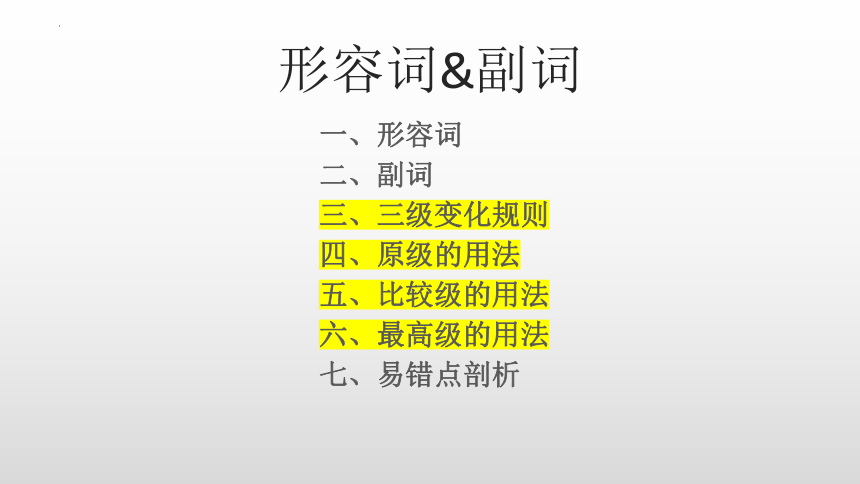
|
|
| 格式 | pptx | ||
| 文件大小 | 686.4KB | ||
| 资源类型 | 教案 | ||
| 版本资源 | 通用版 | ||
| 科目 | 英语 | ||
| 更新时间 | 2023-12-07 11:26:48 | ||
图片预览

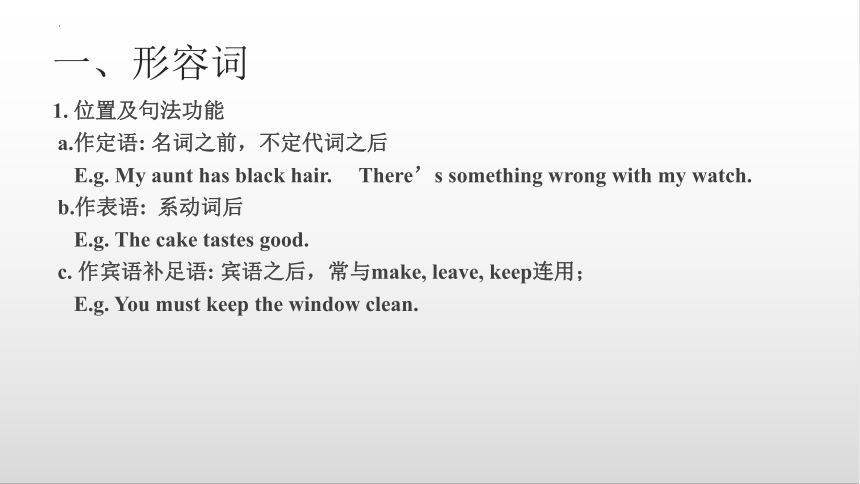
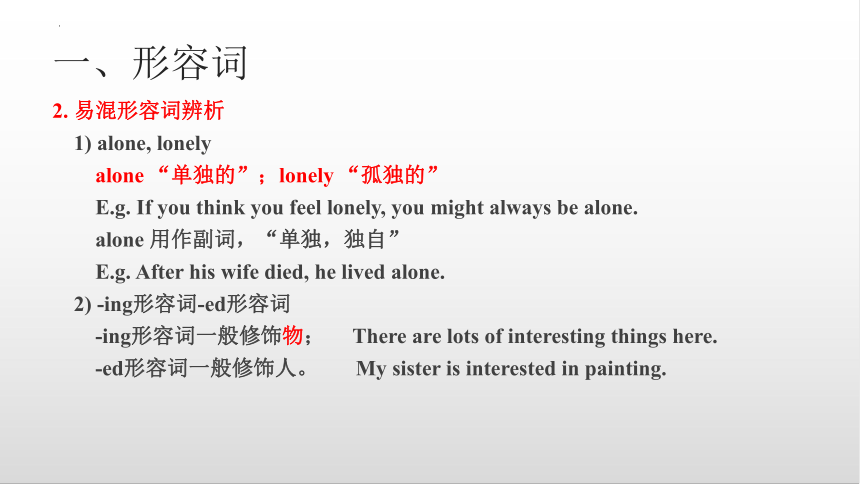
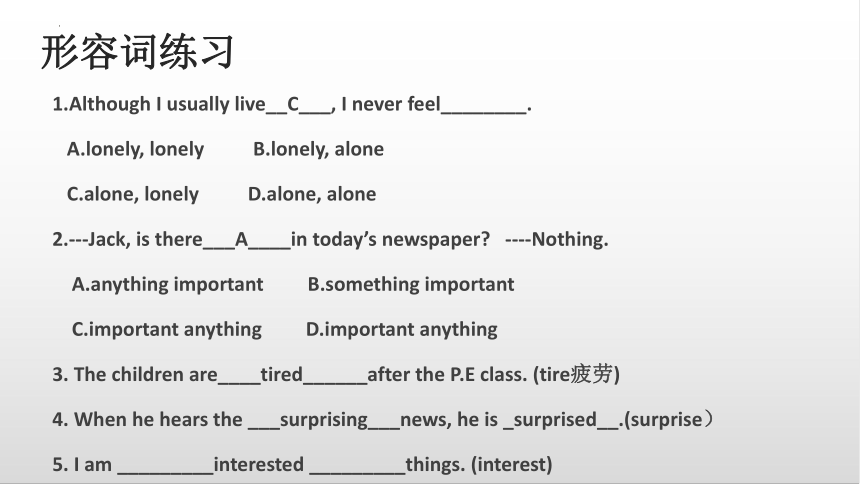
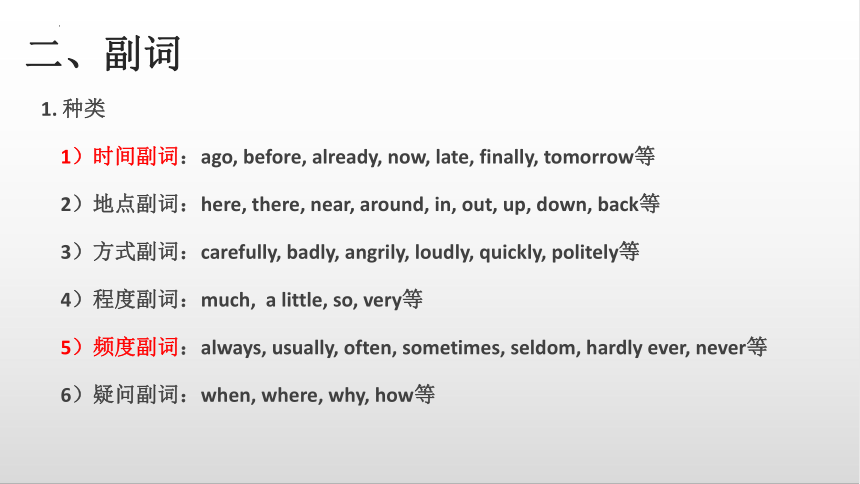
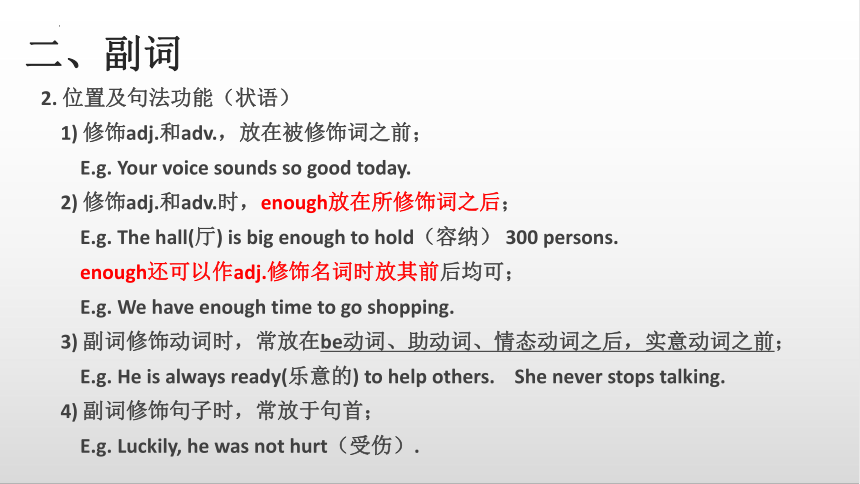
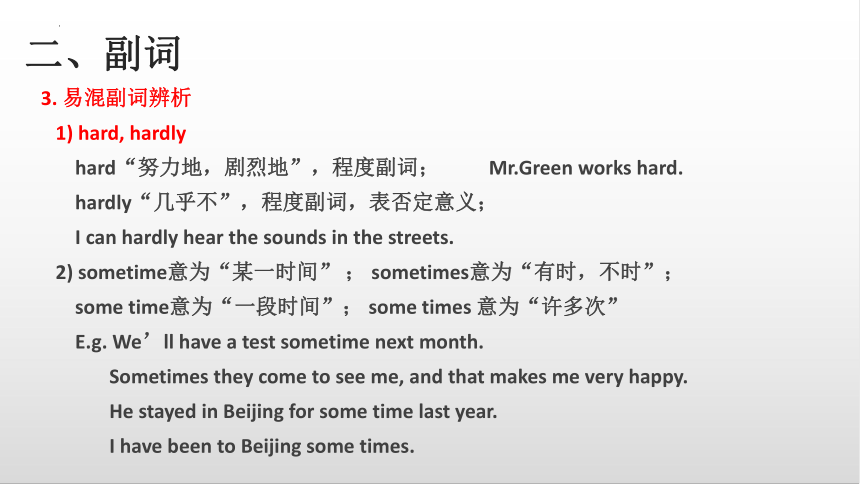
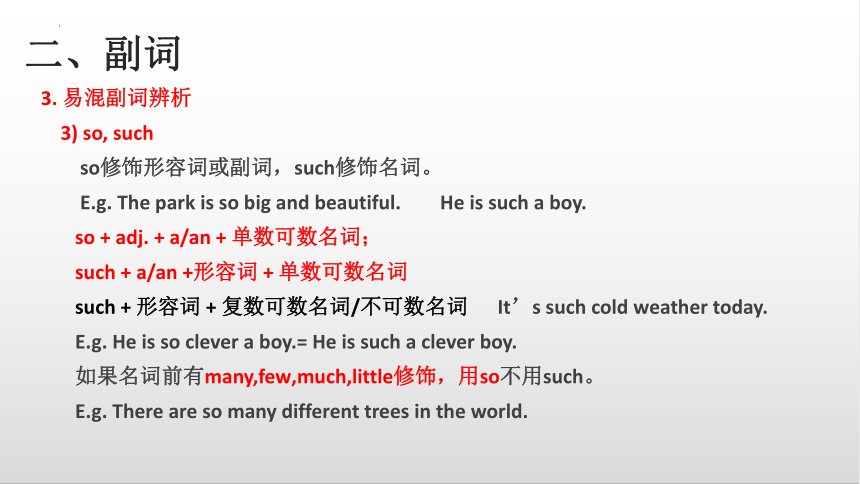
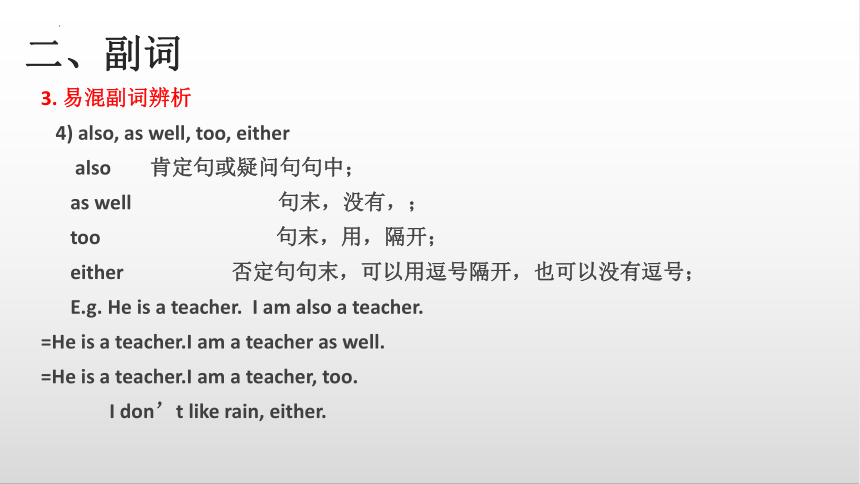
文档简介
(共25张PPT)
形容词&副词
一、形容词
二、副词
三、三级变化规则
四、原级的用法
五、比较级的用法
六、最高级的用法
七、易错点剖析
一、形容词
1. 位置及句法功能
a.作定语: 名词之前,不定代词之后
E.g. My aunt has black hair. There’s something wrong with my watch.
b.作表语: 系动词后
E.g. The cake tastes good.
c. 作宾语补足语: 宾语之后,常与make, leave, keep连用;
E.g. You must keep the window clean.
一、形容词
2. 易混形容词辨析
1) alone, lonely
alone “单独的”;lonely “孤独的”
E.g. If you think you feel lonely, you might always be alone.
alone 用作副词,“单独,独自”
E.g. After his wife died, he lived alone.
2) -ing形容词-ed形容词
-ing形容词一般修饰物; There are lots of interesting things here.
-ed形容词一般修饰人。 My sister is interested in painting.
形容词练习
1.Although I usually live__C___, I never feel________.
A.lonely, lonely B.lonely, alone
C.alone, lonely D.alone, alone
2.---Jack, is there___A____in today’s newspaper ----Nothing.
A.anything important B.something important
C.important anything D.important anything
3. The children are____tired______after the P.E class. (tire疲劳)
4. When he hears the ___surprising___news, he is _surprised__.(surprise)
5. I am _________interested _________things. (interest)
二、副词
1. 种类
1)时间副词:ago, before, already, now, late, finally, tomorrow等
2)地点副词:here, there, near, around, in, out, up, down, back等
3)方式副词:carefully, badly, angrily, loudly, quickly, politely等
4)程度副词:much, a little, so, very等
5)频度副词:always, usually, often, sometimes, seldom, hardly ever, never等
6)疑问副词:when, where, why, how等
二、副词
2. 位置及句法功能(状语)
1) 修饰adj.和adv.,放在被修饰词之前;
E.g. Your voice sounds so good today.
2) 修饰adj.和adv.时,enough放在所修饰词之后;
E.g. The hall(厅) is big enough to hold(容纳) 300 persons.
enough还可以作adj.修饰名词时放其前后均可;
E.g. We have enough time to go shopping.
3) 副词修饰动词时,常放在be动词、助动词、情态动词之后,实意动词之前;
E.g. He is always ready(乐意的) to help others. She never stops talking.
4) 副词修饰句子时,常放于句首;
E.g. Luckily, he was not hurt(受伤).
二、副词
3. 易混副词辨析
1) hard, hardly
hard“努力地,剧烈地”,程度副词; Mr.Green works hard.
hardly“几乎不”,程度副词,表否定意义;
I can hardly hear the sounds in the streets.
2) sometime意为“某一时间” ; sometimes意为“有时,不时”;
some time意为“一段时间”; some times 意为“许多次”
E.g. We’ll have a test sometime next month.
Sometimes they come to see me, and that makes me very happy.
He stayed in Beijing for some time last year.
I have been to Beijing some times.
二、副词
3. 易混副词辨析
3) so, such
so修饰形容词或副词,such修饰名词。
E.g. The park is so big and beautiful. He is such a boy.
so + adj. + a/an + 单数可数名词;
such + a/an +形容词 + 单数可数名词
such + 形容词 + 复数可数名词/不可数名词 It’s such cold weather today.
E.g. He is so clever a boy.= He is such a clever boy.
如果名词前有many,few,much,little修饰,用so不用such。
E.g. There are so many different trees in the world.
二、副词
3. 易混副词辨析
4) also, as well, too, either
also 肯定句或疑问句句中;
as well 句末,没有,;
too 句末,用,隔开;
either 否定句句末,可以用逗号隔开,也可以没有逗号;
E.g. He is a teacher. I am also a teacher.
=He is a teacher.I am a teacher as well.
=He is a teacher.I am a teacher, too.
I don’t like rain, either.
副词练习
1.—I don’t know you take a bus to school.
—Oh, I___A___take a bus, but it is raining today.
A.hardly B.never C.sometimes D.usually
2.—Can you hear me —No, I can’t. Could you please speak___A__
A.clearly enough B.clear enough C.enough clear D.enough clearly
3. I like English. He likes English, __B___.
A. also B.too C. either D. as well
4. Tom studies___B___,so he______fails the exam.
A. hardly; hardly B. hard; hardly C. hard: hard D. hardly: hard
5. To my surprise, ___C____ a little boy can draw _______ many beautiful pictures.
A. so, so B. so, such C. such, so D. such, such
三、三级变化规则
1. 规则变化
构成法 原级 比较级 最高级
一般单音节词未尾加-er,-est tall great taller greater tallest greatest
以不发音的e结尾的单音词和少数以- le结尾的双音节词只加-r,-st nice large nicer larger nicest
largest
以辅音+元音+辅音字母结尾,双写结尾的辅音字母,再加-er,-est big hot bigger hotter biggest
hottest
"以辅音字母+y"结尾的双音节词,改y为i,再加-er,-est easy busy easier busier easiest
busiest
多音节词在前面加more,most来构成比较级和最高级。 important easily more important more easily most important
most easily
三、三级变化规则
2. 不规则变化
原级 比较级
good/well better 两好
bad/badly worse 两坏
many/much more 两多
little less 一少
far farther/further 一远
old older/elder 一老
small different friendly difficult good relaxing healthy short sad funny thin fat successful many little few
四、原级的用法
1. very, so, quite, too后接原级; e.g. The girl is so clever.
2. too…to; so…that; as…as中间用原级;
E.g. It is too cold to go out in winter.
Chen He is as heavy as Li Chen.
3. 否定句式:A + be + not as/so + 原级 + as B “A不及B…”
E.g. Wang Zulan is not as/so tall as Wang Baoqiang.
牛刀小试
1. —I think English is____C___math. —Yes, I think so.
A.much important than B.so important as
C.as important as D.as more important as
2. You can easily find a taxi here. The transportation(交通) in our city is very_A__.
A. convenient B. convenienter C. more convenient D. most convenient
3. ---I think science is more difficult than English.
---I agree. English is___A_____science.
A. not so difficult as B. more difficult than C. the most difficult of
五、比较级的用法
1. 比较级 + any other + 单数名词 “比其他任何…都…”(暗指最高级)
否定词+ 比较级 “不能再...了(暗指最高级)
2. 比较级 + and + 比较级 “越来越…”
E.g. The weather is getting colder and colder.
The girl becomes more and more beautiful.
3. the + 比较级,the + 比较级 “越…,越…”
E.g. The more careful you are, the fewer mistakes you will make.
The more you eat, the fatter you will be.
五、比较级的用法
4. Which /Who is + 比较级,A or B
E.g. Which is easier, math or English
5. …is the + 比较级 + of the two. “…是两者之间更…的一个”
E.g. Tom is the taller of the two boys.
6. 主语 + 谓语/系动词 + 数量 + 比较级 + than….
E.g. My father is three years older than my mother.
7. 比较级的修饰词:much, far, a lot, even, still,a little, a bit.
E.g. He runs much faster than she. 注:more,very不可以修饰比较级。
五、比较级的用法
8. 使用比较级应注意的问题:
避免比较对象的不同:
My schoolbag is newer than you.
My schoolbag is newer than___yours___.
避免与自身相比:
Shanghai is bigger than all the cities in China.
Shanghai is bigger than all the __other____cities in China.
牛刀小试
1.She always does her homework___C___than her brother.
A.more careful B.careful C.more carefully D.carefully
2. ---Our trip to West Hill was great!
---That’s right. I didn’t have a ___C___one before.
A. good B. well C.better D.best
4. ---Is Kate as__D__as Lucy ---No. Kate is_____than Lucy.
A. old;young B. older; young C. older; young D. old; younger
牛刀小试
5.---Mary, how do you like the Internet
---I think it makes our world____A____.
A. more and more interesting B. interesting and interesting
C. most and most interesting
6. Tom is better than any other___B____ in the class.
A. students B. student C. students’
7. Americans eat____C___vegetables each person today as they did in 1910.
A. more than twice B. as twice as many
C. twice as many as D. more than twice as many
六、最高级的用法
1. the + 最高级 + of /in/among+ 比较范围 “在…中最…”。
E.g. He is the tallest of the three.
注:此用法相当于“比较级 + than + any other + 名词单数”
He is taller than any other boy of the three.
2. One of the + 最高级 + 名词复数 + of/in介词短语 “最…中之一”。
E.g. Yaoming is one of the tallest basketball players in the world.
六、最高级的用法
3. the + 序数词 +最高级 “第几…”。
E.g. The Yellow River is the second river in China.
4. Which/Who is the + 最高级,A, B or C
E.g. Which is the biggest, the moon, the earth or the sun
5. This is the + 最高级 + 名词(that)I have ever seen/listened.
E.g. This is the most beautiful city that I have ever visited.
牛刀小试
1. ---Who is____C___, Bill, Tom or John
---I think John is _______than Bill and Tom.
A. serious; more serious B. the most serious; serious
C. the most serious; more serious
2. ---What’s the second___C___river in China
---The Yellow River.
A. longer B. the longer C. longest
3. Bill and Craig are__C___boys, and Craig is_____of the two.
A. taller. tallest B. tall, taller C. tall, the taller
4. The scientists found one of the____A___trees in the world.
A. tallest B. taller C. tall
七、易错点剖析
1. 在系动词后误用副词作表语;
E.g. Everyone thinks that the food tastes well. ×
Everyone thinks that the food tastes good. √
2. 误用双重比较级;
E.g. She felt more better after taking the medicine. ×
She felt much better after taking the medicine. √
形容词&副词
一、形容词
二、副词
三、三级变化规则
四、原级的用法
五、比较级的用法
六、最高级的用法
七、易错点剖析
一、形容词
1. 位置及句法功能
a.作定语: 名词之前,不定代词之后
E.g. My aunt has black hair. There’s something wrong with my watch.
b.作表语: 系动词后
E.g. The cake tastes good.
c. 作宾语补足语: 宾语之后,常与make, leave, keep连用;
E.g. You must keep the window clean.
一、形容词
2. 易混形容词辨析
1) alone, lonely
alone “单独的”;lonely “孤独的”
E.g. If you think you feel lonely, you might always be alone.
alone 用作副词,“单独,独自”
E.g. After his wife died, he lived alone.
2) -ing形容词-ed形容词
-ing形容词一般修饰物; There are lots of interesting things here.
-ed形容词一般修饰人。 My sister is interested in painting.
形容词练习
1.Although I usually live__C___, I never feel________.
A.lonely, lonely B.lonely, alone
C.alone, lonely D.alone, alone
2.---Jack, is there___A____in today’s newspaper ----Nothing.
A.anything important B.something important
C.important anything D.important anything
3. The children are____tired______after the P.E class. (tire疲劳)
4. When he hears the ___surprising___news, he is _surprised__.(surprise)
5. I am _________interested _________things. (interest)
二、副词
1. 种类
1)时间副词:ago, before, already, now, late, finally, tomorrow等
2)地点副词:here, there, near, around, in, out, up, down, back等
3)方式副词:carefully, badly, angrily, loudly, quickly, politely等
4)程度副词:much, a little, so, very等
5)频度副词:always, usually, often, sometimes, seldom, hardly ever, never等
6)疑问副词:when, where, why, how等
二、副词
2. 位置及句法功能(状语)
1) 修饰adj.和adv.,放在被修饰词之前;
E.g. Your voice sounds so good today.
2) 修饰adj.和adv.时,enough放在所修饰词之后;
E.g. The hall(厅) is big enough to hold(容纳) 300 persons.
enough还可以作adj.修饰名词时放其前后均可;
E.g. We have enough time to go shopping.
3) 副词修饰动词时,常放在be动词、助动词、情态动词之后,实意动词之前;
E.g. He is always ready(乐意的) to help others. She never stops talking.
4) 副词修饰句子时,常放于句首;
E.g. Luckily, he was not hurt(受伤).
二、副词
3. 易混副词辨析
1) hard, hardly
hard“努力地,剧烈地”,程度副词; Mr.Green works hard.
hardly“几乎不”,程度副词,表否定意义;
I can hardly hear the sounds in the streets.
2) sometime意为“某一时间” ; sometimes意为“有时,不时”;
some time意为“一段时间”; some times 意为“许多次”
E.g. We’ll have a test sometime next month.
Sometimes they come to see me, and that makes me very happy.
He stayed in Beijing for some time last year.
I have been to Beijing some times.
二、副词
3. 易混副词辨析
3) so, such
so修饰形容词或副词,such修饰名词。
E.g. The park is so big and beautiful. He is such a boy.
so + adj. + a/an + 单数可数名词;
such + a/an +形容词 + 单数可数名词
such + 形容词 + 复数可数名词/不可数名词 It’s such cold weather today.
E.g. He is so clever a boy.= He is such a clever boy.
如果名词前有many,few,much,little修饰,用so不用such。
E.g. There are so many different trees in the world.
二、副词
3. 易混副词辨析
4) also, as well, too, either
also 肯定句或疑问句句中;
as well 句末,没有,;
too 句末,用,隔开;
either 否定句句末,可以用逗号隔开,也可以没有逗号;
E.g. He is a teacher. I am also a teacher.
=He is a teacher.I am a teacher as well.
=He is a teacher.I am a teacher, too.
I don’t like rain, either.
副词练习
1.—I don’t know you take a bus to school.
—Oh, I___A___take a bus, but it is raining today.
A.hardly B.never C.sometimes D.usually
2.—Can you hear me —No, I can’t. Could you please speak___A__
A.clearly enough B.clear enough C.enough clear D.enough clearly
3. I like English. He likes English, __B___.
A. also B.too C. either D. as well
4. Tom studies___B___,so he______fails the exam.
A. hardly; hardly B. hard; hardly C. hard: hard D. hardly: hard
5. To my surprise, ___C____ a little boy can draw _______ many beautiful pictures.
A. so, so B. so, such C. such, so D. such, such
三、三级变化规则
1. 规则变化
构成法 原级 比较级 最高级
一般单音节词未尾加-er,-est tall great taller greater tallest greatest
以不发音的e结尾的单音词和少数以- le结尾的双音节词只加-r,-st nice large nicer larger nicest
largest
以辅音+元音+辅音字母结尾,双写结尾的辅音字母,再加-er,-est big hot bigger hotter biggest
hottest
"以辅音字母+y"结尾的双音节词,改y为i,再加-er,-est easy busy easier busier easiest
busiest
多音节词在前面加more,most来构成比较级和最高级。 important easily more important more easily most important
most easily
三、三级变化规则
2. 不规则变化
原级 比较级
good/well better 两好
bad/badly worse 两坏
many/much more 两多
little less 一少
far farther/further 一远
old older/elder 一老
small different friendly difficult good relaxing healthy short sad funny thin fat successful many little few
四、原级的用法
1. very, so, quite, too后接原级; e.g. The girl is so clever.
2. too…to; so…that; as…as中间用原级;
E.g. It is too cold to go out in winter.
Chen He is as heavy as Li Chen.
3. 否定句式:A + be + not as/so + 原级 + as B “A不及B…”
E.g. Wang Zulan is not as/so tall as Wang Baoqiang.
牛刀小试
1. —I think English is____C___math. —Yes, I think so.
A.much important than B.so important as
C.as important as D.as more important as
2. You can easily find a taxi here. The transportation(交通) in our city is very_A__.
A. convenient B. convenienter C. more convenient D. most convenient
3. ---I think science is more difficult than English.
---I agree. English is___A_____science.
A. not so difficult as B. more difficult than C. the most difficult of
五、比较级的用法
1. 比较级 + any other + 单数名词 “比其他任何…都…”(暗指最高级)
否定词+ 比较级 “不能再...了(暗指最高级)
2. 比较级 + and + 比较级 “越来越…”
E.g. The weather is getting colder and colder.
The girl becomes more and more beautiful.
3. the + 比较级,the + 比较级 “越…,越…”
E.g. The more careful you are, the fewer mistakes you will make.
The more you eat, the fatter you will be.
五、比较级的用法
4. Which /Who is + 比较级,A or B
E.g. Which is easier, math or English
5. …is the + 比较级 + of the two. “…是两者之间更…的一个”
E.g. Tom is the taller of the two boys.
6. 主语 + 谓语/系动词 + 数量 + 比较级 + than….
E.g. My father is three years older than my mother.
7. 比较级的修饰词:much, far, a lot, even, still,a little, a bit.
E.g. He runs much faster than she. 注:more,very不可以修饰比较级。
五、比较级的用法
8. 使用比较级应注意的问题:
避免比较对象的不同:
My schoolbag is newer than you.
My schoolbag is newer than___yours___.
避免与自身相比:
Shanghai is bigger than all the cities in China.
Shanghai is bigger than all the __other____cities in China.
牛刀小试
1.She always does her homework___C___than her brother.
A.more careful B.careful C.more carefully D.carefully
2. ---Our trip to West Hill was great!
---That’s right. I didn’t have a ___C___one before.
A. good B. well C.better D.best
4. ---Is Kate as__D__as Lucy ---No. Kate is_____than Lucy.
A. old;young B. older; young C. older; young D. old; younger
牛刀小试
5.---Mary, how do you like the Internet
---I think it makes our world____A____.
A. more and more interesting B. interesting and interesting
C. most and most interesting
6. Tom is better than any other___B____ in the class.
A. students B. student C. students’
7. Americans eat____C___vegetables each person today as they did in 1910.
A. more than twice B. as twice as many
C. twice as many as D. more than twice as many
六、最高级的用法
1. the + 最高级 + of /in/among+ 比较范围 “在…中最…”。
E.g. He is the tallest of the three.
注:此用法相当于“比较级 + than + any other + 名词单数”
He is taller than any other boy of the three.
2. One of the + 最高级 + 名词复数 + of/in介词短语 “最…中之一”。
E.g. Yaoming is one of the tallest basketball players in the world.
六、最高级的用法
3. the + 序数词 +最高级 “第几…”。
E.g. The Yellow River is the second river in China.
4. Which/Who is the + 最高级,A, B or C
E.g. Which is the biggest, the moon, the earth or the sun
5. This is the + 最高级 + 名词(that)I have ever seen/listened.
E.g. This is the most beautiful city that I have ever visited.
牛刀小试
1. ---Who is____C___, Bill, Tom or John
---I think John is _______than Bill and Tom.
A. serious; more serious B. the most serious; serious
C. the most serious; more serious
2. ---What’s the second___C___river in China
---The Yellow River.
A. longer B. the longer C. longest
3. Bill and Craig are__C___boys, and Craig is_____of the two.
A. taller. tallest B. tall, taller C. tall, the taller
4. The scientists found one of the____A___trees in the world.
A. tallest B. taller C. tall
七、易错点剖析
1. 在系动词后误用副词作表语;
E.g. Everyone thinks that the food tastes well. ×
Everyone thinks that the food tastes good. √
2. 误用双重比较级;
E.g. She felt more better after taking the medicine. ×
She felt much better after taking the medicine. √
同课章节目录
- 词法
- 名词
- 动词和动词短语
- 动词语态
- 动词时态
- 助动词和情态动词
- 非谓语动词
- 冠词
- 代词
- 数词和量词
- 形容词副词及其比较等级
- 介词和介词短语
- 连词和感叹词
- 构词法
- 相似、相近词比较
- 句法
- 陈述句
- 一般疑问句和否定疑问句
- 特殊疑问句及选择疑问句
- 反意疑问句
- 存在句(There be句型)
- 宾语从句
- 定语从句
- 状语从句
- 主谓一致问题
- 简单句
- 并列句
- 复合句
- 主谓一致
- 主、表语从句
- 名词性从句
- 直接引语和间接引语
- 虚拟语气
- 感叹句
- 强调句
- 倒装句
- 祈使句
- 句子的成分
- 句子的分类
- 题型专区
- 单项选择部分
- 易错题
- 完形填空
- 阅读理解
- 词汇练习
- 听说训练
- 句型转换
- 补全对话
- 短文改错
- 翻译
- 书面表达
- 任务型阅读
- 语法填空
- 其他资料
